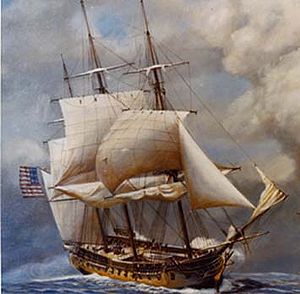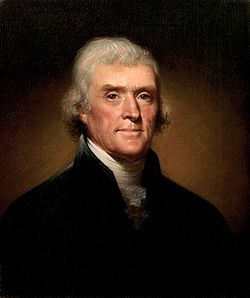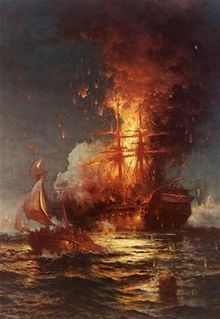| |
|
|
|
|
 1798 - 1802 (~ 4 years) Submit Photo / Document 1798 - 1802 (~ 4 years) Submit Photo / Document
| |
Date |
Event(s) |
| 1 | 1797 | |
| 2 | 1798 | - 1798—1798: First planned human experiment with vaccination, to test theories of Edward Jenner
- Feb 1798—Feb 1798: The Irish Rebellion; 100,000 peasants revolt; approximately 25,000 die - Irish
Parliament abolished (Feb-Oct)
- 7 Jul 1798—30 Sep 1800:
 Franco-American War Franco-American War
- 1 Aug 1798—1 Aug 1798: Battle of the Nile (won by Nelson)
|
| 3 | 1799 | - 1799—1799: Foundation of Royal Military College Sandhurst by the Duke of York
- 1799—1799: Foundation of the Royal Institution of Great Britain
- 9 Jan 1799—9 Jan 1799: Pitt brings in 10% income tax, as a wartime financial measure
- 12 Jul 1799—12 Jul 1799: 'Combination Laws' in Britain against political associations and combinations
- 15 Jul 1799—15 Jul 1799: ?Rosetta Stone' discovered in Egypt made possible the deciphering (in 1822) of Ancient Egyptian hieroglyphics
|
| 4 | 1800 | - 1800—1800: Electric light first produced by Sir Humphrey Davy
- 1800—1800: Use of high pressure steam pioneered by Richard Trevithick (1771-1833)
- 1800—1800: Royal College of Surgeons founded
- 1800—1800: Herschel discovers infra-red light
- 1800—1800: Volta makes first electrical battery
- 2 Jul 1800—2 Jul 1800: Parliamentary union of Great Britain and Ireland
|
| 5 | 1801 | - 1801—1801: Grand Union Canal opens in England
- 1801—1801: Elgin Marbles brought from Athens to London
- 1 Jan 1801—1 Jan 1801: Union Jack becomes the official British flag
- 4 Mar 1801—4 Mar 1809:
 Thomas Jefferson U.S. Presidency Thomas Jefferson U.S. Presidency
- 10 Mar 1801—10 Mar 1801: First census puts the population of England and Wales at 9,168,000. Population of Britain nearly 11 million (75% rural)
- 10 May 1801—10 Jun 1805:
 First Barbary War First Barbary War
- 24 Dec 1801—24 Dec 1801: Richard Trevithick built the first self-propelled passenger carrying road loco
|
| 6 | 1802 | - 25 Mar 1802—25 Mar 1802: Treaty of Amiens signed by Britain, France, Spain, and the Netherlands ? the 'Peace of Amiens' as it was known brought a temporary peace of 14 months during the Napoleonic Wars ? one of its most important cultural effects was that travel and correspondence across the English Channel became possible again
|
|
|
|
|
|



 Submit Photo / Document
Submit Photo / Document
